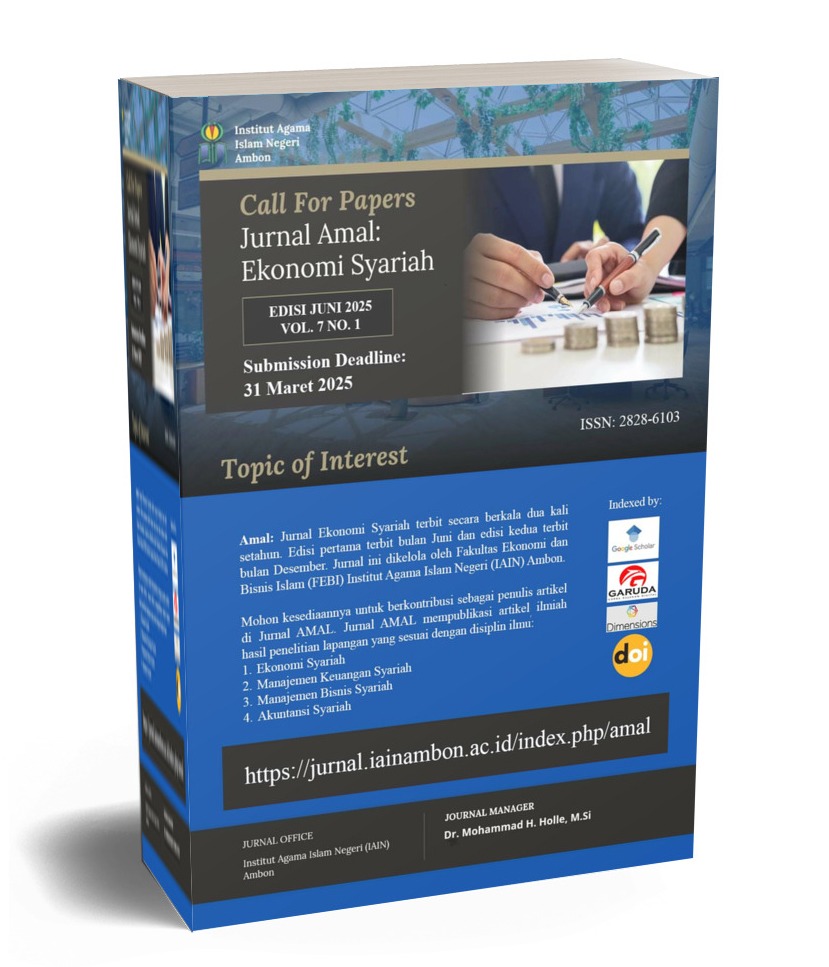Zakat Sebagai Instrumen Ekonomi Islam Dalam Upaya Pemerataan Ekonomi Masyarakat
DOI:
https://doi.org/10.33477/eksy.v7i1.8520Keywords:
Zakat, income distribution, economic equalityAbstract
This research is motivated by the large level of public expenditure gap that leads to inequality, with the Gini index as a reference. Considering Indonesia as a country with a large Muslim population, which is the second largest in the world. So, the contribution of zakat is considered an effort that can reduce the level of inequality. Therefore, this research was conducted with the aim of describing the contribution of zakat as an instrument of Islamic economics in the distribution of income in the context of economic equality. The research method is a qualitative approach with the type of literature research. The results of the research obtained that zakat is used as an instrument in Islamic economics, which has been proven to be effective as a means of income redistribution so that income is not distributed to certain groups but also flows to all levels of society, so that economic justice can occur. Furthermore, it can be seen that Indonesia has a great ability to manage zakat, if its management can contribute to the mustahik. The distribution of national ZIS in 2023 the poor occupy the top position in its allocation. Thus, the involvement of zakat can be used as a driver to improve both economic and social welfare, which is reflected in the achievement of justice in the economy or income distribution.
References
Achmad, N. (2024). Asnaf Fisabilillah in Meeting The Needs of The Ummah : Its Limitations and Flexibilities. 9, 122–142.
Alim, M. N., & Z. Basri, M. T. (2020). Financial Determinants in Zakat Institution Management Affecting Muzakky Loyalty in Indonesia. International Journal of Business and Management, 9(2), 35–47.
Ani Qotuz Zuhro’, F., & Puspitasari, I. F. dan N. (2019). Analysis of Financial Performance of National Amil Zakat Institution in Indonesia. International Journal of Research Science & Management, 6(6), 60–69. https://doi.org/10.5281/zenodo.3260733
Aris, M. (2021). Eksistensi Nilai Al ‘Adalah Pada Kebijakan Zakat di Indonesia. Jurnal Pemikiran Dan Penelitian Ekonomi Islam, 9(1), 55.
BAZNAS. (2024). Oulook Zakat Indonesia 2024 Kata Pengantar Direktur Kajian dan Pengembangan ZIS DSKL: Penyusun: Penyunting: Penerbit. 1–103. www.baznas.go.id;
BPS (2023). Tingkat Ketimpangan Pengeluaran Penduduk Indonesia Maret 2023. Berita Resmi Statistik, No. 48/07/(17 Juli 2023), 1–8.
Daaim, M. S. (2019). Mustahik Zakat Dalam Perspektif Syariah dan Implementasinya di Indonesia. Jurnal Ilmiah Keagamaan Dan Kemasyarakatan, 2(1), 231–234.
Fathonih, A. (2019). The Zakat Way Strategi dan Langkah-Langkah Optimasi Fungsi Zakat dalam Menyejahterakan Fakir-Miskin di Indonesia. In Sustainability (Switzerland) (Vol. 11, Issue 1). http://scioteca.caf.com/bitstream/handle/123456789/1091/RED2017-Eng-8ene.pdf?sequence=12&isAllowed=y%0Ahttp://dx.doi.org/10.1016/j.regsciurbeco.2008.06.005%0Ahttps://www.researchgate.net/publication/305320484_SISTEM_PEMBETUNGAN_TERPUSAT_STRATEGI_MELESTARI
Ghofur, R. A. (2016). Peran Instrumen Distribusi Ekonomi Islam Dalam Menciptakan Kesejahteraan Di Masyarakat. Jurnal Ekonomi Dan Bisnis Islam (Journal of Economics and Business Economics Islam), 1(1), 27–39. https://ejournal.radenintan.ac.id/index.php/ikonomika
Husain, M. K. (2021). Contribution of Zakat and Community Economic Welfare. Indonesian Journal of Social Science Research, 2(1), 39–43.
Isnaini Harahap, N. R. L. dan T. B. (2023). Peran Zakat dalam Meningkatkan pendapatan Nasional. Jurnal Ekonomi Dan Perbankan Syariah, 8(2), 1155–1170.
Kamal, A. H., Purbowisanti, R., Sani, A. A., & Setiorini, K. R. (2021). Does the Distribution of Zakat and Islamic Bank Financing Affect Income Inequality in Indonesia? Amwaluna: Jurnal Ekonomi Dan Keuangan Syariah, 5(1), 90–102. https://doi.org/10.29313/amwaluna.v5i1.5854
Makraja, F. (2024). Zakat Sebagai Instrumen Ekonomi Islam Dalam. Journal of Sharia and Law, 3(1), 113–126.
Marenza, S. E. (2024). A Comparative Analysis of Zakat and Waqf Management in Indonesia and Pakistan. Jurnal Syarikah : Jurnal Ekonomi Islam, 10(1), 12–20. https://doi.org/10.30997/jsei.v10i1.11390
Moniruzzaman (2024). Exploring Zakat Entities And Their Functions In Bangladesh : A Comprehensive Overview And Prospective Pathways For Amplification. International Journal of Zakat, 9(1), 29–46.
Nurrizka Puji Lestari, & Ilmiawan Auwalin. (2022). Zakat and Income Inequality in Indonesia: Panel Data Analysis in 34 Provinces. Jurnal Ekonomi Syariah Teori Dan Terapan, 9(6), 898–912. https://doi.org/10.20473/vol9iss20226pp898-912
Rahman, M. M. (2024). Institutional Zakat Management in Bangladesh: Collection and Distribution Practices. AZKA International Journal of Zakat & Social Finance, 5(2), 129–154. https://doi.org/10.51377/azjaf.vol5no2.192
Rahmawaty, A. (2013). Upaya Pemerataan Kesejahteraan Melalui Keadilan Distributif. Equilibrium, 1(1), 1–17.
Rini, R., Fatimah, F., & Purwanti, A. (2020). Zakat and poverty: An Indonesian experience. International Journal of Innovation, Creativity and Change, 10(11), 759–770.
Rozalinda. (2014). Ekonomi Islam: Teori dan Aplikasinya Pada Aktivitas Ekonomi. Rajagrafindo.
Sugiyono. (2012). Metode Penelitian Kuantitatif, Kualitatif, dan R&D. CV Alfabeta.
Syahrin, M. A., Luayyin, R. H., Arifin, M., & Hidayat, R. (2022). Pemerataan Distribusi Untuk Menanggulangi Kesenjangan Ekonomi Masyarakat Perspektif Ekonomi Islam. JSE: Jurnal Sharia Economica, 1(1), 38–49. https://doi.org/10.46773/.v1i1.252
Wahyuni, S., Majid, M. S. A., & Ridwan, M. (2023). Mekanisme Distribusi Kekayaan Negara Dalam Ekonomi Islam. NUSANTARA: Jurnal Ilmu Pengetahuan Sosial, 10(5), 2652–2666.
Zein, A. S. (2020). Strategi Pemberdayaan Ekonomi Mustahiq Melalui Pendistribusian Zakat Produktif. Al-Masharif: Jurnal Ilmu Ekonomi Dan Keislaman, 8(2), 266–282. https://doi.org/10.24952/masharif.v8i2.3356.
Downloads
Published
How to Cite
Issue
Section
License
Copyright (c) 2025 Johan Dwi Sutikno, Mashudi, Binti Nur Asiyah

This work is licensed under a Creative Commons Attribution-NonCommercial-ShareAlike 4.0 International License.
This work is licensed under a Creative Commons Attribution-NonCommercial-ShareAlike 4.0 International License









